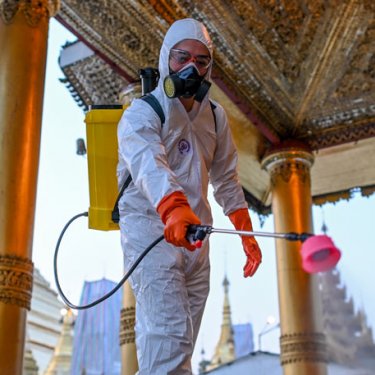In mid-coronavirus crisis, Myanmar blocks 221 sites for “fake news”

Reporters Without Borders (RSF) calls on Myanmar’s authorities to immediately restore mobile phone access to the 221 news websites they have arbitrarily blocked on the pretext of combatting disinformation during the Covid-19 crisis, in what is a disturbingly authoritarian move.
Without any public announcement, the transport and communications ministry issued orders to Myanmar’s four mobile phone operators in the last two weeks of March to block access to a total of 221 sites on the grounds that they were spreading “fake news,” to use the ministry’s term.
The government has not provided a list of the censored sites, but several leading media outlets are now blocked, as are a number of news sites aimed above all at Myanmar’s ethnic minorities.
According to a statement issued by one of the operators, Telenor Myanmar, whose headquarters is in Norway, the legal basis given by the government was article 77 of the telecommunications law, which allows sites to be blocked in an “emergency situation.” The ministry’s concern was “fake news” about Covid-19, an official later claimed.
Telenor Myanmar eventually complied with the order fully after initially resisting. The other three mobile operators, which are either state or army offshoots, all appear to have complied immediately.
“While it is legitimate to combat all disinformation during a crisis such as the one caused by the coronavirus, the method used by Myanmar’s government is utterly inappropriate and is even proving to be dangerous,” said Daniel Bastard, the head of the RSF’s Asia-Pacific desk.
“The censorship that the authorities are in practice applying to many news websites is going to deny sectors of the Myanmar population of reliable information that is absolutely crucial to combatting the pandemic. This decision recalls the worst times of the military dictatorship and sets Myanmar’s democracy back ten years.”
Thirst for news
After years of censorship, Myanmar’s population is now turning en masse to the mobile Internet to get their news. According to a survey published on 1 April, mobile Internet use increased by 25% in March, in a sign of the thirst for information among Myanmar’s 64 million mobile subscribers during the pandemic.
The blocking of these websites has coincided with other disturbing press freedom violations. On 31 March the police raided the headquarters of the Narinjara news agency in Sittwe, the capital of the troubled northwestern state of Rakhine, questioning three of its journalists, Thein Zaw, Aung Lin Htun and Htun Khaing, for six hours and seizing their laptops.
At the same time, ten police officers raided the home of Hline Thit Zin Wai, the editor of Khit Thit News, a news agency based in the southern city of Yangon.
Accused of terrorism
The day before that, on 30 March, Voice of Myanmar website editor Nay Myo Lin was arrested in the central city Mandalay.
All five journalists are facing charges of “terrorism” for interviewing or quoting the Arakan Army (AA), a rebel group seeking autonomy for Rakhine. A bugbear of Myanmar’s military, the AA was officially declared to be a terrorist organization on 23 March.
According to the information obtained by RSF, several other journalists have gone into hiding because they fear imminent arrest for having referred to the AA in their recent reporting.
Myanmar is ranked 138th out of 180 countries in RSF’s 2019 World Press Freedom Index, after falling seven places in the previous two years.



